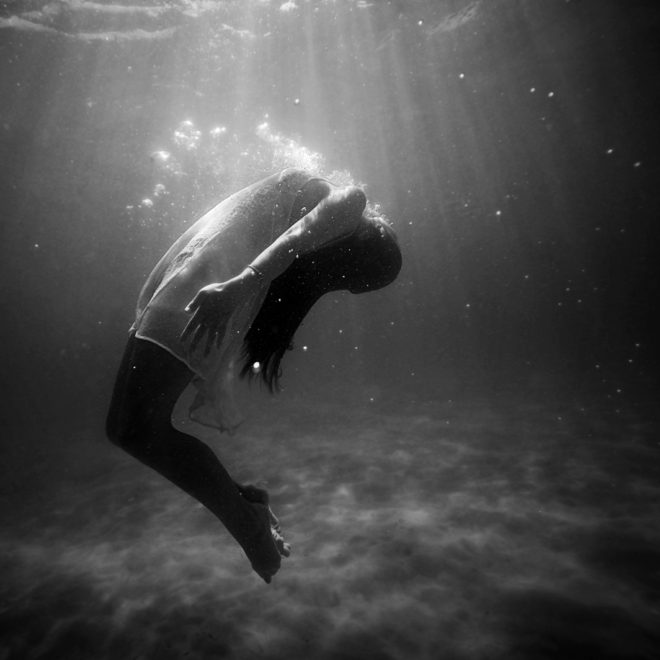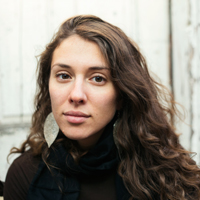FOUR POEMS by Julia Kolchinsky Dasbach, featured on Life As Activism

FOUR POEMS
by Julia Kolchinsky Dasbach
Featured on Life As Activism
Other women don’t tell you
………..flash flood warning will come
through text message now, you will read
………..about the water filling narrow streets
without looking out to see
………..how high it’s risen. You will scour
the internet for what’s inside
………..the stomach, because no one
told you of the rennet, how it settles
………..lactic floods, turns milk, curdling
its casein to help digest
………..a mother’s overflow, to help
your son endure how much of you
………..you leave inside him.
Your curtains are nailed down, rust
………..in falloff, because
you never found
………..the rods to hold them and the rain
kept knocking to get in.
………..You couldn’t stand to look
at all that water, but when
………..your son flash flooded white
with bits of eggs and bread and even
………..cat hair, there was nowhere
to hide from all that rising, and all
………..the water keeping you
inside, was not enough.
He doesn’t notice the desert.
The smell of the dead rising, birds or fish, saltwater
feeding on air or salt air on the water, the sand
turning black as it wraps his ankles like a skeleton hand.
He doesn’t know why the horseshoe crab shells
are empty, isn’t old enough to ask
about their blue blood and how we harvest it.
He doesn’t wonder where the living have gone
and I’m grateful for this. For how he can focus
on the steady horizon and fall headfirst
into a wave’s undertow. For how he rises
masked in muck, his mouth full and laughing.
For how his anxious body rushes back.
For how it’s made of water, made for crossing
deserts, for not noticing the dead.
Dyadya Voda
my son calls any body
of water—man, mister,
uncle water, uncle sea, uncle
ocean, dyadya, not father
but close, though we
didn’t teach him this.
Kinship, nature flowing
into family, vast
expanse into what is
already inside of him.
Obnimi Dyadyu Voda,
he says, and wraps
his arms around the waves,
Hug Uncle Water, and falls flat
onto the sand, palms
wide and sinking
as though into my body,
and around us
dogs, everywhere, my son
is the only toddler, your kids
are beautiful, a passerby says,
she means our dog too,
Dyadya, my son calls her.
You should have more, she adds,
have a whole litter, and
if you have them close together,
his cheek is in the sand and
mouth full of salt, What’s
one more? Everything, I think
and want to hold him
but he is water and no matter
how wide I stretch my arms,
I cannot hug or count
the whole of him.
As Flesh, Not Stone
Remember, I tried. Not that this is any
consolation. Even now, writing it
feels like the opposite. I guess I’m referring
to distance. I tried to keep it
better than my mother or hers. Tried
to find the middle ground where your head
can meet my chest without being bound
or sinking. Where it can rest as flesh
not stone. Tried to keep that place
where our hands reach without touch,
to be okay with the empty space between.
—me water me me water me water me—
Remember the time I asked you to kiss me
and you said, no mama! pushing my face away
with your hand’s heel and then your foot’s.
Remember how I listened. Let you choose
anything else over what you are made of.
—water me water me water water water—
Remember? The bathtub was only half full
when you slipped and asked me to kiss
your soapy ear lobe so the pain would stop.
But it didn’t. Not really. Remember, I tried.
 Julia Kolchinsky Dasbach emigrated from Dnepropetrovsk, Ukraine as a Jewish refugee when she was six years old. She holds an MFA in Poetry from the University of Oregon and is a Ph.D. candidate in Comparative Literature at the University of Pennsylvania, where her research focuses on contemporary American poetry about the Holocaust. She has received fellowships from the Bread Loaf and TENT Conferences as well as the Auschwitz Jewish Center. Julia is the author of The Bear Who Ate the Stars (Split Lip Press, 2014) and her poems appear in Gulf Coast, TriQuarterly, and Nashville Review, among others, and are forthcoming from Best New Poets, APR, and Poetry International. Most recently, she won the Williams Carlos Williams University Poetry Prize from the Academy of American Poets and New South’s Poetry Prize. Julia is also Editor-in-Chief of Construction Magazine and when not busy chasing her toddler around the playgrounds of Philadelphia, she writes a blog about motherhood.
Julia Kolchinsky Dasbach emigrated from Dnepropetrovsk, Ukraine as a Jewish refugee when she was six years old. She holds an MFA in Poetry from the University of Oregon and is a Ph.D. candidate in Comparative Literature at the University of Pennsylvania, where her research focuses on contemporary American poetry about the Holocaust. She has received fellowships from the Bread Loaf and TENT Conferences as well as the Auschwitz Jewish Center. Julia is the author of The Bear Who Ate the Stars (Split Lip Press, 2014) and her poems appear in Gulf Coast, TriQuarterly, and Nashville Review, among others, and are forthcoming from Best New Poets, APR, and Poetry International. Most recently, she won the Williams Carlos Williams University Poetry Prize from the Academy of American Poets and New South’s Poetry Prize. Julia is also Editor-in-Chief of Construction Magazine and when not busy chasing her toddler around the playgrounds of Philadelphia, she writes a blog about motherhood.
Image Credit: Christopher Campbell on Unsplash
Author photo by Ekaterina Izmestieva.
